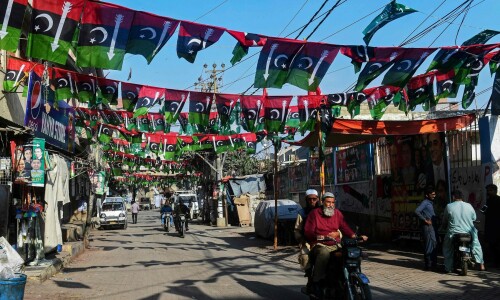• Commission says caretakers do not have mandate to legislate, tells them to stick to routine matters
• Cabinet approves restructuring plan; two oversight bodies for Customs, IRS; Federal Policy Board on the cards
• Shamshad says tax-to-GDP ratio to be at 18pc in five years
ISLAMABAD: After the Election Commission of Pakistan (ECP) barred the caretaker government from moving ahead with its controversial plan to restructure the Federal Board of Revenue (FBR), caretaker Finance Minister Shamshad Akhtar said the restructuring roadmap approved by all stakeholders will be ‘operationalised’ by the elected government.
The caretaker minister revealed this plan during a televised address after the federal cabinet decided to restructure and digitise the tax watchdog, to which the ECP took an exception and asked the caretakers to stick to ‘routine’ and ‘non-controversial’ matters, which are “reversible” by the future government.
The federal cabinet approved the restructuring and digitalisation plan to raise tax share in the gross domestic product (GDP) to 18 per cent within the next five years, i.e. by 2029, said caretaker Finance Minister Shamshad Akhtar about the cabinet decision.
“The whole package of legal amendments, rules and regulations, as well as, required administrative interventions will be operationalised by the upcoming elected government,” she said. The plan entails 2,200 amendments, including 700 to 800 amendments that are complex and require legislation.
In an ostensible response to the reservations expressed by the ECP over the caretakers’ move to revamp the FBR, Ms Shamshad said all the stakeholders had already been on board and the plan was also approved by the Special Investment Facilitation Council.
“The competence of the caretaker government to develop the proposals for restructuring and digitisation of the FBR was endorsed by the federal cabinet and an implementation committee will be notified to carry out follow-up activities to prepare the required package of legislative and administrative changes,” she said.
She said there would be no retrenchment of the staff and they would retain their civil service status, adding that the FBR would carry out this restructuring within its existing resources and budget.
The minister claimed that proposed reforms were developed in consultation with all stakeholders, including the FBR chairman and members.
‘Tax-to-GDP ratio on decline’
Ms Shamshad said Pakistan’s tax-to-GDP ratio has been declining, with the FBR tax-GDP ratio barely 8.5pc in 2022-23, while the country’s tax capacity has remained largely around 22pc of GDP, including the taxes under the purview of provinces that yield barely 1pc of GDP revenues.
The number of taxpayers in Pakistan is barely 2.3 million. Corporate tax filers are 0.8pc of commercial and industrial electricity users and GST-registered entities are barely 13pc of the 1.4 million taxpayers.
‘Restructuring blueprint’
The key elements of restructuring include the separation of policy functions from operations — the former to be handled by the Federal Policy Board (FPB). There will be a separate establishment of Customs and Inland Revenue organisations headed by director generals (DGs) from respective service cadres. The federal government will appoint the DGs.
This is in line with the international best practices — almost 73pc of countries have separate Customs organisations, since their functions and businesses are different and changing, with the need for Customs to harness global integration, boost exports and fight smuggling and money laundering.
‘Oversight mechanism’
There will be oversight boards which will be responsible for holding these Customs and IRS to higher standards of performance while also ensuring policy and compliance functions.
These boards — the Customs Oversight Board (COB) and the Internal Revenue Oversight Board (IROB) — will be headed by the finance minister and include federal secretaries of finance, commerce and revenue, tax experts, as well as Nadra chairman. There will be four independent board members.
The FPB would be headed by the finance minister and would include academics as members.
The FPB’s mandate would focus on policy and strategy, while the operational performance would be in the domain of oversight boards.
The revenue secretary, from Customs or IRS cadres, would act as the secretary to the FPB, reporting to the finance minister, and would facilitate the issuance of common and harmonised policies as well as coordinate and collaborate matters between the Customs and IRS.
A tax policy office will be established in the Revenue Division with a mandate to conduct solid research, offer empirical analysis on taxation, and recommend tax policy changes and assess the projections of possible revenue from different sectors which currently may not be estimated properly.
Customs will continue to collect taxes at the import and domestic levels, including customs duty, additional customs duty, regulatory duties, export development surcharge, and other taxes assigned by the government. Customs will operate as a withholding agent, collecting IR taxes at the import stage. IR targets will include income tax, sales tax, excise duty, WWF, CVT, and any other taxes assigned by the government.
The revenue division handles international taxes, valuation of goods and assets, IT and digitisation, data sharing between the two DGs, integrity, and human resources.
‘ECP takes exception’
A letter sent by the ECP to the caretaker premier’s secretary said that the caretakers did not have the mandate to legislate and they should stick to day-to-day affairs. It said Section 230 of the Elections Act 2017 defines the “scope of functions of the caretaker government”.
The caretaker government should “restrict itself to activities that are of routine, non-controversial and urgent, in the public interest and reversible by the future government elected after the elections”. The ECP noted that the planned overhauling of the FBR “falls under major policy decision which was the prerogative of the elected government”.
“In light of the above, I have been directed to convey that the caretaker prime minister may be advised not to go for major reforms in FBR and to keep it pending till the election of the elected government…” the letter read.
Published in Dawn, January 31st, 2024













































Dear visitor, the comments section is undergoing an overhaul and will return soon.